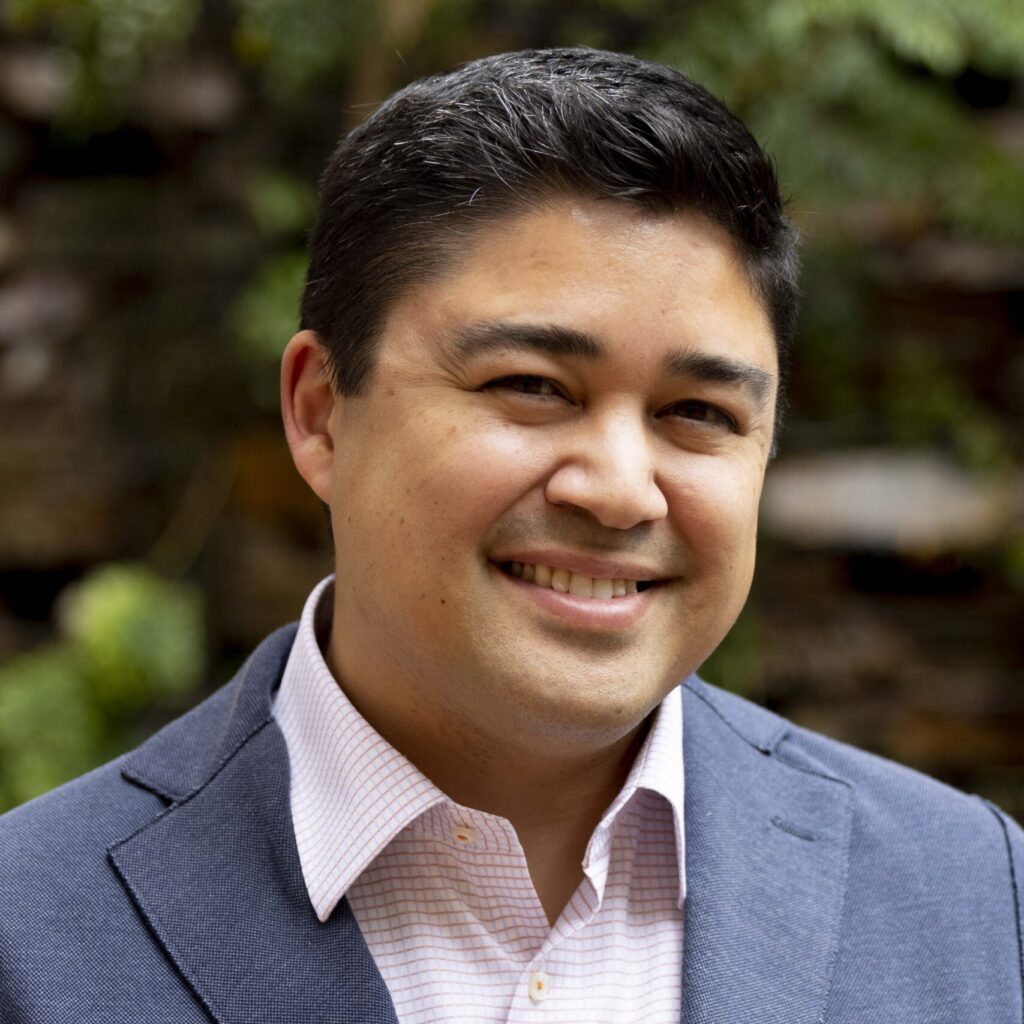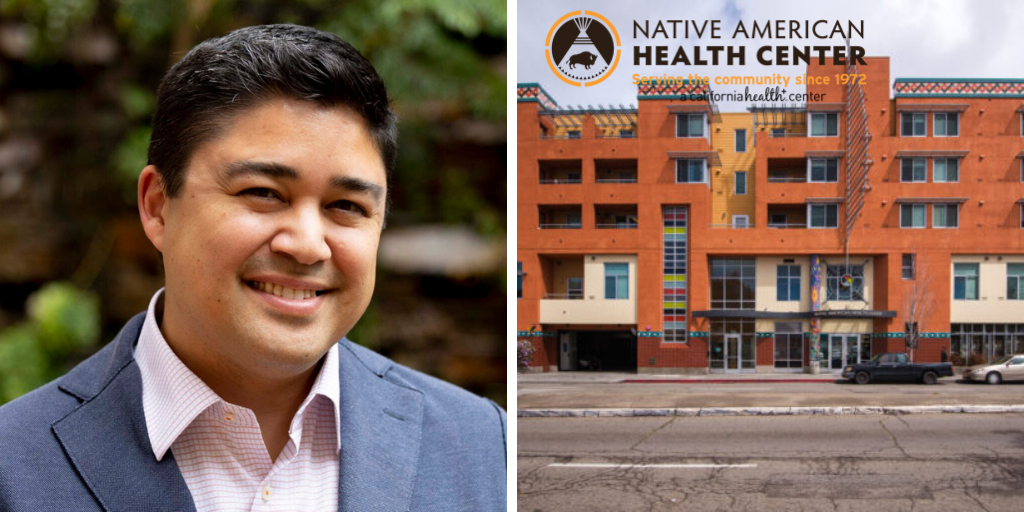Dr. Utaka Springer Shares His Insights About the Importance of Mental Wellbeing for All
June 2024
Last year we sat down with Dr. Utaka Springer, Native American Health Center’s (NAHC) first Chief of Behavioral Health to learn more about their work, the importance of providing access to mental health services, and the pivotal role community health centers play in early detection and preventative behavioral healthcare services.
You can read the first interview in full here Link HERE.
June is Men’s Mental Health Month [1] and this year, the U.S. Department of Health and Human Services (HHS) Office of Minority Health (OMH) is focusing on improving health outcomes for racial and ethnic minority and American Indian/Alaska Native (AI/AN) men through its theme and we thought it would be the perfect time to revisit Dr. Springer and learn more about the ways in which he and NAHC are working towards educating, raising awareness and supporting overall mental wellbeing for men and other behavioral health patients throughout the year and not just during June.
 Name: Dr. Utaka Springer
Name: Dr. Utaka Springer
Title: Chief Behavioral Health Officer (CBHO), Native American Health Center (NAHC)
Guiding Quote: Effective healthcare is not just about medicine, behavioral health, or any one service acting in isolation. Our services are much stronger when woven together, within the fabric of the community.
Alameda Health Consortium: Why is Men’s Mental Health Month Important?
Dr. Utaka Springer: First, I recognize there is a lot of diversity in our cultural and historical ideas of maleness and what it means to be a “man.” Anytime we have an “awareness month”, the underlying message is that there is an important and overlooked need that should be appreciated with fresh eyes and an open heart. There is an unfortunate historical legacy across many cultures that attending to one’s mental wellness is not something “men” can fully embrace. Many men in generations past (and present) have been socialized to believe that they cannot or should not experience or express a full range of emotions, be vulnerable, or reach out to others for help when they hit a wall. To me, awareness of Men’s Mental Health Month is about calling attention to the need to adjust our perceptions — towards the view that mental health is health, and that it is important and healthy for everyone to promote their mental health whether they identify as male or female. Self-reliance can be a terrific quality, but it is also important to practice self-care, and sometimes necessary good to stop and ask for directions, so to speak, from a professional.
AHC: Are there common mental health issues faced by male patients at NAHC?
US: What’s actually more interesting is not what differentiates male and female clients but just how much overlap there is in the kinds of mental health issues we see across genders – early life trauma exposures or neglect, depression, anxiety, and struggles with substance addictions.
Some males present for mental healthcare only when compelled to do so, such as in court mandated situations, or at the urging of their female partners in the case of heterosexual males. In contrast, females tend to self-refer for therapy more frequently than males, though this is changing over time and there are always exceptions.
Since COVID, there has been a real shift in perceptions of the value of mental health in our clinic. Before COVID, fear of professional consequences associated with seeking mental healthcare was a bigger barrier for our clients. These days, people understand that mental health struggles have been a very common experience and are much more accepting of the value of mental healthcare, regardless of gender. People are willing to openly talk about seeing a therapist or being on medication to manage depression, anxiety, attention-deficit symptoms, or other challenges. Overall, there’s definitely less tiptoeing around the topic of mental wellness. In fact, you could say that one of the silver linings of COVID is how mental healthcare has become much more normalized across both genders.
AHC: What are common barriers you’re witnessing that prevent men from seeking mental healthcare?
US: There has been an ongoing revolution in how we think about the defining characteristics of a “man.” Decades ago, males were disproportionately socialized towards performance -based identity, accomplishment, competition, and unwavering confidence – or at least an outward projection of these traits.
What we’ve all seen is that men who conform to high masculine traits also struggle with mental wellness. Our first responders and military warriors are two examples. My wife, Dr. Shauna Springer, is a nationally renowned psychologist who has focused her service and writing on these two populations. She often points out that warfighters and first responders are the strongest, bravest people in our society, and yet they die by suicide at disproportionate rates. It’s not because they’re not resilient enough. As she puts it, “We are all resilient…until we’re not.”
What we’ve learned is that the idea of “maleness” needs to incorporate the reality that men are human, that we have a full range of human emotions, that we need connection, and that we can be vulnerable. When men hit a wall, we need to know that we’re not broken, and that healing is possible with the right insights and the right support.
AHC: Can you share more about the mental health system and culture, particularly around communities of color. 
US: One of the barriers for people of color relates to trust in their providers. It can be harder to develop trust with a provider who does not look like themselves or who does not have the same cultural context.
Having providers who speak the language and understand the culture of the client, who know the context of national or cultural trauma within a certain group is very important. If providers have a different cultural background, then it is critical for these providers to be humble and to gain cultural competence to support their client population.
One thing that does not seem to be as much a barrier is the predominance of female providers within mental health. Male clients often request female providers. I would guess this is because of a fear of judgment from another male with stereotypically “male” traits. Sometimes being assigned to a male provider is the best thing for a client. When a male client has an experience of an NAHC mental health provider as non-judgmental, this can not only be very healing, but can also directly demonstrate how men can be strong and vulnerable at the same time.
AHC: What do we need to combat stigmas around mental healthcare?
US: There’s good news – in the last two decades, we’ve come a long way in reducing stigma. Remember Tony Soprano from HBO’s TV series, “The Sopranos”? He’s quite possibly done more for men’s mental health than any other pop culture figure. To see an example of a hyper-masculine, high-testosterone male benefiting from therapy was a game changer for men who could benefit from the same. Subsequent shows like “In Therapy”, movies like “Analyze This,” reality shows, public health messages, and countless personal stories on YouTube, Reddit, and TikTok from a generation that is today highly comfortable talking about mental health as part of physical health – these examples are now everywhere and all have played a strong role in decreasing stigma. Ultimately, stigma is decreased when people see mental health providers as part of their Whole Health team – and mental health check-ups as no less valuable than regular dental cleanings.
AHC: What are you and your team at NAHC doing to raise awareness and promote mental healthcare?
US: To build momentum on efforts to combat stigma, NAHC is working hard to bring as many qualified people as we can. All of our providers strive to be culturally humble, curious, and competent to serve our community. We also work to connect our male members with mental health needs to male peers, such as our Fatherhood is Brotherhood group that supports new dads during a stressful transition. We’ve seen programs like this, run by our Community Wellness Department, effectively end patterns of intergenerational transmission of trauma by weaving these fathers into the tapestry of a healthy community. In our community drop-in center in the Mission, we have on display many black-and-white photographs of our male staff with their children, role modeling healthy and nurturing fatherhood for our visitors.
We have benefited from strong leadership in our recently retired CEO, Marty Waukazoo. Marty honored his wife, Helen Waukazoo, by continually showing respect for her strength as a female leader and trailblazer within the Native American health community. In identifying his successor, CEO Natalie Aguilera, he has promoted a strong woman with the strength, interpersonal skills and grit to lead the next generation. Marty’s example shows how strong, capable males support and honor the same qualities in the females in their lives. And they exemplify the same qualities themselves, with pride and purpose.
AHC: Is there anything else you wish to share about men’s mental health and resources available to support it?
US: There are many resources online to help people to manage their own challenges strategically or tactically. In fact, many of the concepts used in business and leadership development have been used for decades in mental health treatment settings. These concepts can be applied not just to help people show up at work with their best, most effective self, but also who they are at home and in their closest relationships.
Native American Health Center and the Alameda Alliance are two trusted local resources within the Bay Area. Native American Health Center hosts links to many mental health resources on its website at https://www.nativehealth.org/member-services/new-patients/, both our own resources at https://www.nativehealth.org/services/behavioral-health/ as well as local county and Bay Area resources at https://www.nativehealth.org/resource/. We have also posted a calendar of local events that we host, designed to celebrate diversity and wellness. The calendar of events can be found at https://www.nativehealth.org/events/.
In closing, I want to emphasize that there is great diversity between individuals and that our hope at NAHC is to promote wellness for all clients, regardless of gender, sexual orientation, or other classifications, as part of Whole Health.
